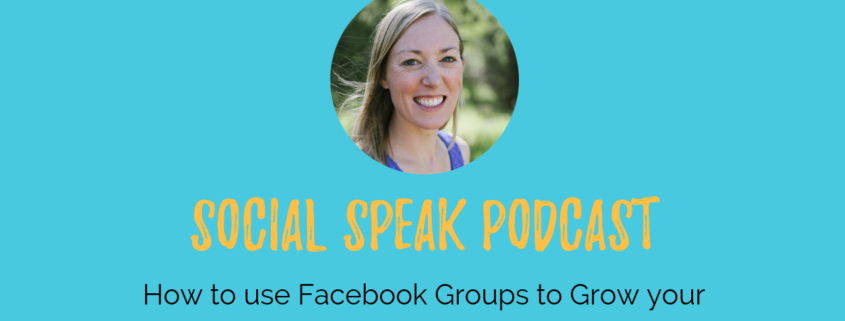Facebook Groups for Health and Wellness Practices
Today’s podcast is about Facebook groups and how to utilize Facebook groups to get in front of prospects, to build a community around your services, and really create that brand image where you are sharing valuable information and building conversations with your target market. So Facebook groups really have a few different purposes.
You can view them as a forum on Facebook, you can view them as a way for people to connect with a community around a certain topic or even in a specific location. And we have seen great success for wellness coaches, dietitians, nutritionists, wellness centers, healthcare organizations, creating groups were their own prospects and members as a way to make sure that they have more consistent communication with those individuals.
Listen to the Podcast on Facebook Groups for Health Care
Watch the Video about Facebook Groups in Health and Wellness Marketing
Read the Transcript
00:00 Speaker 1: Hello everybody, and welcome to this week’s episode of The Social Speak Network podcast. I’m your host, the sweet Caitlin McDonald, the founder over here at the Social Speak Network, and over the past couple of weeks, and moving forward into the next, maybe even a couple of months, we’re going to be talking about the top 10 things that your wellness practice Health Care Center can do on digital marketing to see a return from their investment. And so today, I’m going to be talking about Facebook groups and how to utilize Facebook groups to get in front of prospects, to build a community around your services, and really create that brand image where you are sharing valuable information and building conversations with your target market. So Facebook groups really have a few different purposes. You can view them as a forum on Facebook, you can view them as a way for people to connect with a community around a certain topic or even in a specific location. And we have seen great success for wellness coaches, dieticians, nutritionists, wellness centers, healthcare organizations, creating groups were their own prospects and members as a way to make sure that they have more consistent communication with those individuals.
01:42 S1: Now, in order to make this happen, you have to really make sure that you’re not making the group about you. The group has to be about fostering a community, fostering conversations, and relationships and making sure that you’re not just talking about your own services and your own business. Yes, it’s a great way to share content that you create, but that content that you create, as we’ve said over and over again, really needs to be educational information that your target market and your prospects can take and run with. So for example, let’s say you are a health coach and you have new programs that are coming out. And so these programs, you really wanna share to your community. Now, you could go ahead and share them to your Facebook group. But rather than doing that, I would recommend creating a behind-the-scenes information that somebody might be able to find more expansive version of within the group, excuse me, within the program itself. However, you’re sharing just enough to get them started on the right path. This allows people to do it themselves if they want to, or to understand your expertise, so that they can turn to you for help with guidance down the road.
03:09 S1: Now you don’t wanna just be in there, posting about the group, excuse me, posting about your services individually, because this turns people away, it’s not interactive. Instead of doing that, post questions, answer questions, hop on Facebook live just in front of your group members and really try to foster that, those conversations. Now, it is important to note that right here, I’m talking about a group that is specifically to build a community around your services, and your practice. However, there are a lot of other more broad groups that already exists on Facebook. So, before you create that next group on diabetes, let’s say, make sure that there aren’t groups already out there that are doing a great job. If you’re trying to recreate something that’s already out there, it’s going to take a lot more time and effort to get people to join your group, because they’re already invested in these other groups. Now, I’m not saying don’t do it [chuckle] Facebook Groups are great thing to create, for your practice, but it does definitely take more time if it’s already existing in your space and in your specialties.
04:33 S1: Now, what you could do, if there is a group already made in your area of expertise, is go ahead and join that group. Offer guidance and ask questions, comment on other people’s posts and really start positioning yourself as an expert in that space, and as someone who is trustworthy or as an organization that’s trustworthy. And doing this helps you get that brand recognition, but again, you can’t talk about your services in somebody else’s group. Typically, there are guidelines about this, and it’s just not very professional behavior. We call this in, I mean in most industries, coaching clients from somebody else. And yes, a lot of times, your clients may have worked with somebody else in the past, but you don’t wanna be too salesy as you are trying to build that trust, and really come across as a figure in the space. Then the next tip about utilizing Facebook groups, and this is going back to creating a group yourself, is to be really specific about the purpose and to recognize that it’s going to be difficult to manage the group by yourself.
05:51 S1: And so in terms of understanding and being specific about the group’s purpose, this really helps set the expectations for your group members as they’re joining the group, what they’re going to see, what type of content they’re going to see, and how they can utilize the group to help further their own knowledge, education, and health. And so you want to, if you have a specific purpose and you’ve written the guidelines for the group, it’s important to actually stick to those. So somebody joins, they see the guidelines, maybe they answer a few questions before being approved, then you have to make sure that you are really sticking to those guidelines and being truthful yourself as well as holding other people accountable. Then the second piece there, was [chuckle] inviting other admins and managers to the group. So, in a group, you can have multiple managers. We recommend not just having one person in charge of the group. This really makes it so that there’s less… What we’ve seen in our experience is that there’s less interactions if there’s only one manager. When there are more managers you can even help foster discussions between one another, and people always can have their questions answered more quickly.
07:13 S1: So you can either divide the management based on your own expertise and what topics you are comfortable talking about. Or you can divide it by day of the week, or even time of day. Depending on how active your group is, you might even need somebody on call over the weekend to make sure that those questions are being answered. If somebody’s posting something in the group, and nobody is commenting back in replying, people are going to stop writing back. Now, having multiple group member, or excuse me group admin also makes it easier to keep new conversations forming in the group. So by this I mean, let’s say it’s been a quiet week and no members are really posting anything. As a manager of the group, you can then go in and post something to start spurring the conversation. Maybe you have the first week of the month, you have a standard question that goes out and you see how it changes over time. Maybe it’s asking people for their favorite exercise routine or their favorite activity of the season with their family. Potentially, it’s posting recipes that have to do with a single ingredient that’s timely or seasonal. So all of these things are things that you can do to help boost that engagement on the group, and because you are managing the group, that helps you prove your own expertise and position within the space.
08:47 S1: One other thing I recommend is having individuals introduce themselves when they join the group, and by doing this, you are getting people one, committed, two, participating in the group. If the first thing they do once they join is they start posting in the group, typically they’ll keep on doing it. If you don’t ask them to introduce themselves, oftentimes, they’re not going to. And then another thing that you can do is make sure that when somebody’s requesting to join you ask them questions prior to joining. So you can ask them what topics they’re most interested in, so that you talk about those topics, and for their email address. Now, this email address, if you have a disclosure there, you can mostly add that to your newsletter as well, or you can check to make sure that they’re already on your newsletter and they have to be part of on your newsletter in order to then join your group. So it’s a great way just to build your email list as well.
09:53 S1: So above all, the biggest takeaway when it comes to Facebook groups is really making sure that you are being considerate of others. You aren’t selling yourself too much and that your really, your main goal is to build that community and those relationships with the members of your group. So again, my name’s Caitlin McDonald. I’m the co-founder over here at the Social Speak Network. And thank you so much for tuning into our podcast on Digital Marketing for Health and Wellness Practices. Next week, Amber is going to be diving into utilizing on some tools for social media. So be sure to stick around there. You can download and subscribe to, our podcast on iTunes as well as Podbean and it’s also over on our website, the socialspeaknetwork.com. Thanks so much, and I look forward to seeing you soon.




